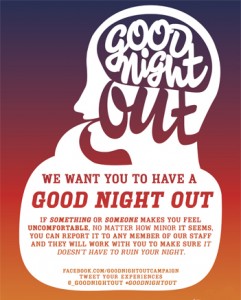Nov. 25 – Dec. 10 are the 16 Days of Activism Against Gender-Based Violence. To commemorate the week, we are featuring 1 activism idea per day. This information is excerpted from my new book Stop Global Street Harassment: Growing Activism Around the World (Praeger 2015).
Groping, grinding, and verbal harassment are common problems at nightlife venues across the world. Groups in both England and the United States have programs to address and combat this unfortunate reality.
 Nightlife harassment stories make up a significant portion of the stories submitted to the Hollaback! London website. Co-Directors Bryony Beynon and Julia Gray wanted to do something about it and lucked out when in 2013, one of London’s biggest and most famous clubs, fabric, contacted them acknowledging that it had a harassment problem. Beynon and Gray worked with the club to create the first anti-harassment policy of its kind in the United Kingdom. “The results were amazing,” Beynon told me. Kristi Weir, the press officer at fabric, agreed, saying, “We’ve received some really positive messages from women thanking us for taking this stance and having their backs since we started publicising the campaign.”
Nightlife harassment stories make up a significant portion of the stories submitted to the Hollaback! London website. Co-Directors Bryony Beynon and Julia Gray wanted to do something about it and lucked out when in 2013, one of London’s biggest and most famous clubs, fabric, contacted them acknowledging that it had a harassment problem. Beynon and Gray worked with the club to create the first anti-harassment policy of its kind in the United Kingdom. “The results were amazing,” Beynon told me. Kristi Weir, the press officer at fabric, agreed, saying, “We’ve received some really positive messages from women thanking us for taking this stance and having their backs since we started publicising the campaign.”
After their success at fabric, Beynon and Gray created the Good Night Out Campaign and launched it as a London pilot on International Women’s Day in March 2014. Only a few months later, it spread across the United Kingdom and Ireland, and within a few more months, 95 licensed premises had signed on to the campaign. The women told me the establishments range from “superclubs to tiny pubs, university union bars, from theatres to pizza joints” and that more are signing up every week.
The women customize the program to meet each establishment’s needs and only move forward once everyone there is committed and will sign the pledge, which in part reads: “We want you to have a Good Night Out. If something or someone makes you feel uncomfortable, you can speak to any member of staff, and they will work with you to make sure it doesn’t have to ruin your night.” The premise must post this pledge very visibly around the venue. This is “so that customers really see them and are aware that they’re in an environment that doesn’t tolerate harassment.”
The staff members of each premise receive an hour-long training session about harassment and handling reports that includes what to say to avoid using victim-blaming language. They also can get other training tools like a hints and tips sheet for the back bar areas. The Good Night Out Campaign is expanding quickly. Through a new partnership with their local council in Southwark, the campaign will soon deliver the training to every venue in the area. Through another new partnership with the national alcohol awareness nonprofit organization Drinkaware, the campaign will “provide training and advice on a pilot project aimed at reducing harassment on nights out by placing hosts in licensed premises to provide help and support.”
Similar programs are underway in the United States in Washington, D.C., Arizona, Iowa City, and Boston. Washington, D.C.’s program Safe Bars is a collaboration between grassroots groups Defend Yourself and Collective Action for Safe Spaces. In Arizona, the program is run by a sexual violence prevention arm of the Arizona Department of Health and Human Services. The Rape Victims Advocacy Program and Women’s Resource and Action Center at the University of Iowa is working with bar staff at venues in downtown Iowa City. The Boston program is run through the Boston Rape Crisis Center in collaboration with law enforcement and the Alcoholic Beverages Control Commission.
The reach of each program has been much smaller than the Good Night Out Campaign, but feedback from venues that have used the training has been very positive, and staff members feel better able to address harassment in their establishments.
Help fund our work in 2016, donate to our end-of-year giving campaign!
